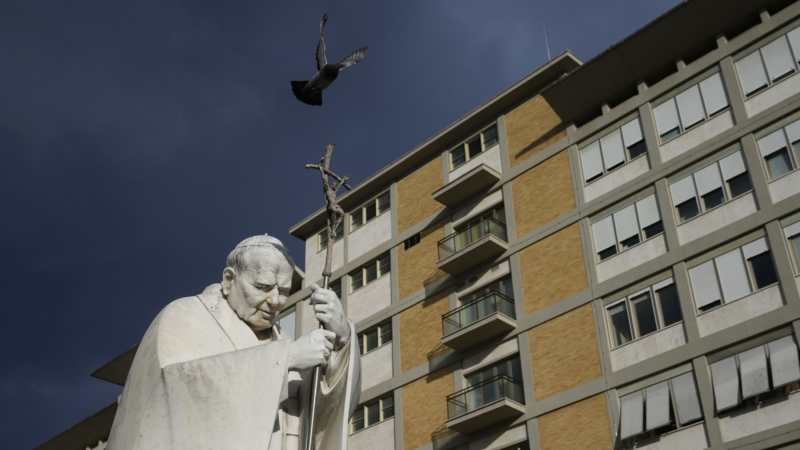Doctors order ‘absolute rest’ for Pope Francis due to respiratory infection
ROME — Doctors on Saturday prescribed “absolute rest” for Pope Francis and modified the treatment for his respiratory tract infection, the Vatican said, a day after the 88-year-old pope was admitted to a hospital following a weeklong bout of bronchitis.
On doctors’ orders, Francis won’t deliver his traditional Sunday noon blessing, which he could have done from his hospital room if he was well enough.
Francis slept well during a quiet first night in the hospital, ate breakfast, read the newspapers and received the Eucharist on Saturday, alternating rest with prayer and reading during the afternoon, the Vatican said.
The Argentine pope was admitted to Rome’s Gemelli hospital on Friday after a weeklong bout of bronchitis worsened. It was his fourth hospitalization since his 2013 election and raised questions about his increasingly precarious health.
Preliminary tests showed that he had a respiratory tract infection, which was confirmed Saturday. In a late afternoon bulletin, the Vatican said that Francis had no fever on Saturday and that tests showed some improvement.
The Vatican canceled his audiences through Monday at least.
Francis, who is prone to respiratory infections in winter, was diagnosed with bronchitis on Feb. 6, but had continued to hold daily audiences in his Vatican hotel suite. He had presided at an outdoor Mass last weekend and attended his general audience Wednesday. But he has been handing off his speeches for an aide to read aloud, saying he was having trouble breathing.
“To facilitate his recovery, the medical staff prescribed absolute rest,” a Vatican statement said.
Francis had part of one lung removed as a young man and has battled other health problems.
He had 33 centimeters (13 inches) of his large intestine removed in 2021 because of a narrowing of the colon. He had further abdominal surgery in 2023 to remove intestinal scar tissue and repair a hernia. He uses a wheelchair, walker or cane when moving around his apartment and recently fell twice, hurting his arm and chin.
Rome’s Gemelli hospital has a private suite for popes on the 10th floor. Francis revealed that during a 2023 hospitalization, he was actually diagnosed with “an acute and strong pneumonia, in the lower part of the lungs.”
Sometimes bronchitis can lead to pneumonia, a deeper and far more serious infection of the lungs’ air sacs. Doctors may detect pneumonia by listening for a crackling or whistling sound in the lungs while the patient breathes, but often other tests are needed including a chest X-ray and pulse oximetry that measures how much oxygen is in the blood.
Treatment varies by severity but can include providing oxygen through a nasal tube or mask, intravenous fluids — and treatment of the underlying cause of the infection.
Trump says U.S. will resume sending weapons to Ukraine after pausing last week
With Russian attacks escalating, Ukraine is dependent on air defense systems and munitions supplied by western allies to protect Ukrainian cities.
100 years after evolution went on trial, the Scopes case still reverberates
One hundred years ago, the small town of Dayton, Tenn., became the unlikely stage for one of the most sensational trials in American history, over the teaching of Darwin's theory of evolution.
RFK Jr.’s vaccine policy sparks a lawsuit from the American Academy of Pediatrics
AAP and other leading health organizations allege that the health secretary violated federal law when he took the COVID vaccine off the list of recommended shots for pregnant women and healthy children.
Sea lions are released after toxic algae bloom in California
Marine mammal researchers are investigating how sea lions were affected by the longest toxic algal bloom on record off the coast of Southern California. Some sea lions are now being released back into the wild.
The health of U.S. kids has declined significantly since 2007, new study finds
A new study in the journal JAMA finds the health of America's children has worsened across several key indicators over the last two decades. That includes the number of children with chronic diseases.
The U.S. has millions of old gas and oil wells. Here’s what it takes to plug them up
There was a circle in Maria Burns' yard where grass wouldn't grow and trees died. She knew what it was: An old natural gas well, plugged when she was a little girl, starting to leak again.









